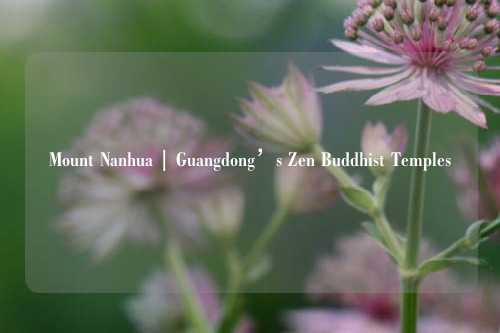Mount Nanhua | Guangdong’s Zen Buddhist Temples
The Spiritual Legacy of Mount Nanhua
Mount Nanhua, located in Guangdong Province, is one of the most revered Buddhist sites in China, particularly known for its deep connection to Zen Buddhism. The mountain, often referred to as the "Zen Buddhist Mountain," has served as a center of spiritual practice for centuries. Its tranquil environment, ancient temples, and association with renowned Zen masters make it an essential destination for anyone seeking to understand the roots of Zen Buddhism.
What sets Mount Nanhua apart from other sacred Buddhist sites in China is its historical significance in the development of Zen Buddhism. It is famously home to the Nanhua Temple, where the renowned Zen master Huineng, considered the Sixth Patriarch of Zen, received his teachings. Huineng’s legacy remains a vital part of the mountain’s spiritual aura, and visitors often come to the site to pay homage to this influential figure and to reflect on the teachings of Chan (Zen) Buddhism. The serene surroundings of Mount Nanhua serve as a perfect backdrop for meditation, offering a profound atmosphere for personal reflection and spiritual growth.

The Beauty of Mount Nanhua's Natural Landscape
The natural beauty of Mount Nanhua plays an integral role in its spiritual appeal. The mountain is adorned with dense forests, lush vegetation, and winding streams that create a sense of peace and harmony with nature. Visitors to the site can enjoy a variety of walking paths that lead through shaded areas filled with ancient trees and vibrant plant life. These paths invite a deeper connection to the natural world, which is central to Zen teachings that emphasize simplicity, tranquility, and being in tune with one’s environment.
The mountain itself is not overly high, but its rolling hills, quiet valleys, and serene environment provide a peaceful escape from the hustle and bustle of daily life. For those seeking a spiritual journey, hiking up the gentle slopes of Mount Nanhua is an enriching experience that allows one to fully appreciate the natural beauty of the area. Whether wandering through forested trails or taking in the view from one of the temple courtyards, the landscape of Mount Nanhua offers an opportunity to disconnect from modern distractions and immerse oneself in the stillness of nature.
Nanhua Temple: The Heart of Zen Buddhism
At the heart of Mount Nanhua lies the Nanhua Temple, which holds great significance in the history of Zen Buddhism. Originally built during the Tang Dynasty, the temple has undergone numerous reconstructions and expansions over the centuries, but it remains a central place of worship, practice, and learning for Buddhist practitioners. The Nanhua Temple is where Huineng, the Sixth Patriarch of Zen, received his teachings and is believed to have reached enlightenment. This association with such an influential figure has cemented the temple’s place as one of the most important Zen Buddhist temples in China.
Visitors to Nanhua Temple are greeted by its peaceful ambiance, where the scent of incense mingles with the sounds of chanting monks. The temple’s architecture reflects the traditional style of Chinese Buddhist structures, with intricate wooden carvings, elegant pavilions, and large courtyards that provide space for meditation and contemplation. The temple is home to various sacred relics, including the stone pillar where Huineng’s teachings were inscribed, making it an essential pilgrimage site for Zen practitioners.
The presence of Buddhist monks in the temple, who continue the tradition of meditation and teaching, adds to the spiritual energy of the site. Pilgrims often come to participate in rituals or seek spiritual guidance, further solidifying the temple’s reputation as a place of deep religious significance.
The Role of Mount Nanhua in Zen Philosophy
Zen Buddhism, also known as Chan Buddhism in China, is known for its focus on direct experience and meditation as a means to achieve enlightenment. Mount Nanhua, with its connection to Huineng and its long history as a Zen center, is a living embodiment of these principles. The teachings of Zen emphasize the importance of inner clarity, non-attachment, and mindfulness, and these ideals are reflected in the peaceful environment of Mount Nanhua. It is not just a place for religious ceremonies; it is also a place for introspection and the cultivation of wisdom.
Visitors who come to Mount Nanhua to explore Zen philosophy often do so with the intention of deepening their understanding of life and spirituality. The practice of sitting meditation, known as zazen, is commonly performed within the temple grounds, where the quiet and simplicity of the surroundings facilitate a deeper connection to one’s inner self. The Zen teachings that originated at Mount Nanhua continue to influence many practitioners of Buddhism around the world, with the mountain standing as a living testament to the enduring legacy of Huineng and his teachings.
Scenic Trails and Temples of Mount Nanhua
In addition to its historical and spiritual significance, Mount Nanhua is also home to a number of other temples and scenic spots. Visitors can explore the various trails that lead to different temples, each with its unique character and ambiance. The mountain is dotted with smaller temples and shrines dedicated to various Buddhist figures, offering peaceful spaces for reflection and prayer. These temples are often nestled in serene locations, surrounded by natural beauty, creating the perfect environment for spiritual contemplation.
One of the most beautiful aspects of Mount Nanhua is the integration of the temples with the natural landscape. The paths leading to the temples often wind through dense forests, and many temples are perched on the slopes of the mountain, offering stunning views of the surrounding valleys and peaks. The combination of religious architecture and the natural surroundings makes Mount Nanhua an ideal location for those seeking spiritual solace in nature.
The Sacred Mountain’s Cultural Impact
Mount Nanhua has not only played a central role in the development of Zen Buddhism but has also had a profound influence on Chinese culture and the global spread of Zen teachings. The legacy of Huineng and the Nanhua Temple continues to shape the practice of Zen today. Zen Buddhist concepts such as simplicity, mindfulness, and direct experience have had a lasting impact on both Chinese culture and the broader spiritual world.
The mountain has also inspired countless works of art, poetry, and literature, with many artists and writers drawing inspiration from the tranquility and beauty of Mount Nanhua. Its role as a cultural hub makes it a site of great historical importance, attracting visitors not only for religious purposes but also for those interested in Chinese cultural heritage and the development of Zen thought.
Visiting Mount Nanhua
For those wishing to visit Mount Nanhua, access is relatively easy from the city of Shaoguan, which is approximately 50 kilometers away. Shaoguan is well connected to major cities in Guangdong Province, and visitors can take a bus, taxi, or train to reach the mountain. Once at the base, visitors can either hike up the mountain or take a cable car to reach the main temple areas.
The best times to visit Mount Nanhua are during the spring and autumn months when the weather is mild and the mountain is at its most beautiful. During these times, the forests are lush, and the mountain is often shrouded in mist, creating an atmosphere of serenity and quiet reflection. However, visitors can enjoy the mountain year-round, as each season offers a unique perspective of the landscape.
Mount Nanhua’s Enduring Appeal
Mount Nanhua remains one of the most important religious and cultural sites in China, offering visitors a chance to connect with the roots of Zen Buddhism and experience the beauty and tranquility of nature. The mountain’s deep spiritual significance, coupled with its breathtaking natural surroundings, make it an exceptional destination for those seeking a deeper understanding of Buddhism and a chance to reflect on life’s bigger questions. Whether you are drawn to the teachings of Huineng, the peaceful environment for meditation, or simply the beauty of the mountain itself, Mount Nanhua provides an enriching experience for all who visit.
















